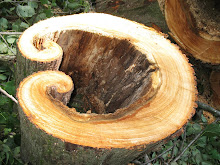Marlene Nourbese Philip
We read Nourbese Philp's amazing book of poetry called She Tries Her Tongue.She is a Carribean woman who moved to Canada and became a writer. Since 1983 she has been struggling with the idea of mother tongue for people who were enslaved and whose original language was stripped from them. There is something horrific about creating art with the words of the overseer.
In her quest for original language she has done a lot of work in Patois, but she also writes passionately in standard English. She Tries Her Tongue brings in so many different kinds of language it made my head spin. She begins with an essay on language that starts out entirely in the academic language of English and then moves into Patois and back into standard.
There are poems that make use of definitions, historical edicts for slave owners, the sound of words. It is an homage to language.
It is interesting to think about getting back to an original language. Most of us are not speaking the language of our ancestors, at least not in the U.S. or Canada. We speak the languages of conquerors and imperial powers. But there is a great difference between my speaking English as a granddaughter of Swedish immigrants who chose to come here. Immigrants who struggled to learn English and didn't speak Swedish in the home so their children would not speak with an accent. There's a big difference between that and former slaves whose language was forcibly ripped from them. Sometimes by the roots of the tongue.
For Nourbese Philip, the idea of getting back to her original language has been a very fertile ground for creation of great work. It doesn't send me off and running in any great directions though. I don't think Swedish is my "original language." I think language is a tool and you choose your tool for maximum impact.
I would be interested in doing a paper on Nourbese Philip and the sociolinguistics of language and dialect choice. This might be my first paper. I need to poke around a bit. Read more about her linguistic journey.


0 Comments:
Post a comment
<< Home